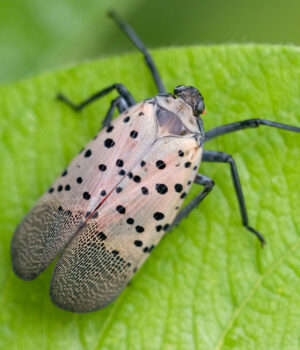If you see a winged red hued, black polka dot patterned bug larger than the size of a quarter, squish it immediately.
Although coated in a pretty pattern, this ridiculously destructive insect is a much larger ecoterrorist than you might think. Spotted Lantern flies are an incredibly invasive species native to China and Vietnam, however since 2014 have been spreading like wildfire within the United States. Due to our ecosystem not having any natural predators to combat against them, the flies just continue to populate and spread all across the east coast. But how can they be so harmful, and why is it such an issue now?
To begin, Spotted Lantern flies are notorious for damaging trees and cash crops. They love to suck on the sap of foliage such as the “Tree of Heaven,” maple, oak, willow, hickory and more. The most intense infestations can kill the trees entirely. They also love sucking the life out of apples, peaches, cherries, plums and so forth. The most vulnerable of all is grapevines. In fact, local organic Virginia vineyards have had to cut down a majority of their grapevines just to give the plants more focus due to the intense sap sucking creatures.
What’s even worse? Spotted Lantern flies secrete honeydew, and sadly it’s not nearly as sweet as the fruit. This sticky substance latches onto plants, patios, and even cars, which later attract black mold to grow in its stead. Because of this, entire outdoor areas have had to be destroyed and rebuilt, as well as interfering with the photosynthesis of plants; meaning even less food for harvest.
Adults commonly mature from late August through October, meaning their peak season is nigh upon us. I’ve spotted them personally up in NOVA, central Virginia, and now horrifically, Roanoke College. They are everywhere on campus.
I’ve already had to stomp on at least ten since the semester began, with a noticeable volume around West Hall, Freshens, the Bank Building, and behind Sutton Terrace. I implore you dear reader: spread the word about spotted lantern flies to your friends, and squish them if you see one. They love to hop around on the ground, so you might need to practice your footwork beforehand. Mother nature will thank you for your contributions.
Zachary Bayers
Editor-in-Chief




